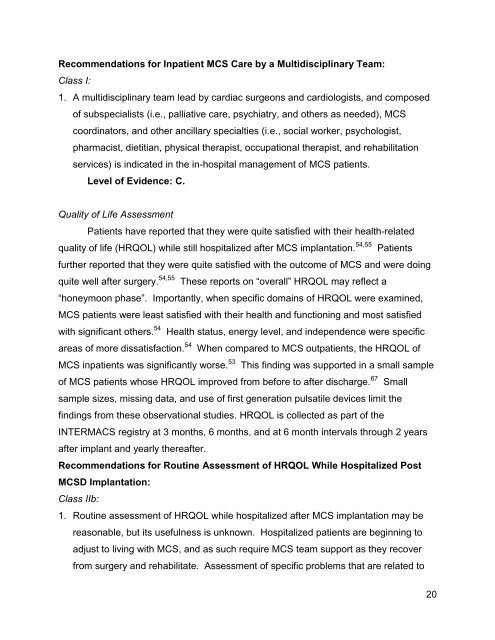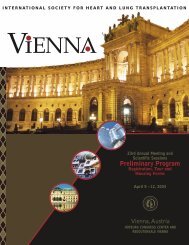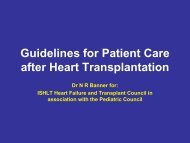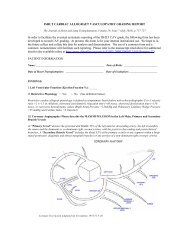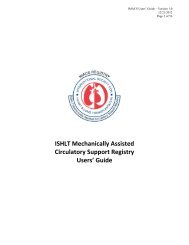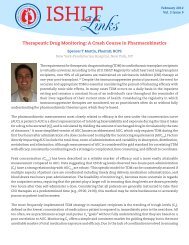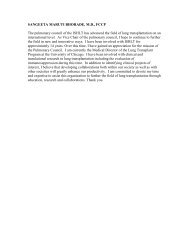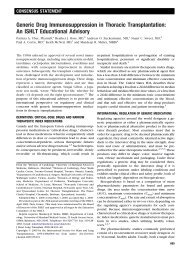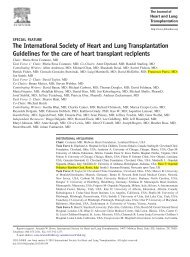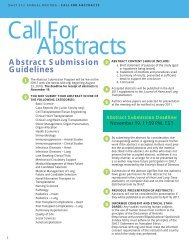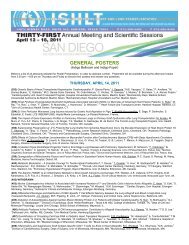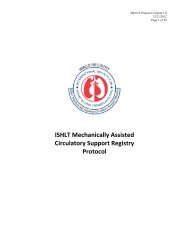Task Force 4: Inpatient Management of Patients with MCSD - The ...
Task Force 4: Inpatient Management of Patients with MCSD - The ...
Task Force 4: Inpatient Management of Patients with MCSD - The ...
You also want an ePaper? Increase the reach of your titles
YUMPU automatically turns print PDFs into web optimized ePapers that Google loves.
Recommendations for <strong>Inpatient</strong> MCS Care by a Multidisciplinary Team:<br />
Class I:<br />
1. A multidisciplinary team lead by cardiac surgeons and cardiologists, and composed<br />
<strong>of</strong> subspecialists (i.e., palliative care, psychiatry, and others as needed), MCS<br />
coordinators, and other ancillary specialties (i.e., social worker, psychologist,<br />
pharmacist, dietitian, physical therapist, occupational therapist, and rehabilitation<br />
services) is indicated in the in-hospital management <strong>of</strong> MCS patients.<br />
Level <strong>of</strong> Evidence: C.<br />
Quality <strong>of</strong> Life Assessment<br />
<strong>Patients</strong> have reported that they were quite satisfied <strong>with</strong> their health-related<br />
quality <strong>of</strong> life (HRQOL) while still hospitalized after MCS implantation. 54,55 <strong>Patients</strong><br />
further reported that they were quite satisfied <strong>with</strong> the outcome <strong>of</strong> MCS and were doing<br />
quite well after surgery. 54,55 <strong>The</strong>se reports on “overall” HRQOL may reflect a<br />
“honeymoon phase”. Importantly, when specific domains <strong>of</strong> HRQOL were examined,<br />
MCS patients were least satisfied <strong>with</strong> their health and functioning and most satisfied<br />
<strong>with</strong> significant others. 54 Health status, energy level, and independence were specific<br />
areas <strong>of</strong> more dissatisfaction. 54 When compared to MCS outpatients, the HRQOL <strong>of</strong><br />
MCS inpatients was significantly worse. 53 This finding was supported in a small sample<br />
<strong>of</strong> MCS patients whose HRQOL improved from before to after discharge. 67 Small<br />
sample sizes, missing data, and use <strong>of</strong> first generation pulsatile devices limit the<br />
findings from these observational studies. HRQOL is collected as part <strong>of</strong> the<br />
INTERMACS registry at 3 months, 6 months, and at 6 month intervals through 2 years<br />
after implant and yearly thereafter.<br />
Recommendations for Routine Assessment <strong>of</strong> HRQOL While Hospitalized Post<br />
<strong>MCSD</strong> Implantation:<br />
Class IIb:<br />
1. Routine assessment <strong>of</strong> HRQOL while hospitalized after MCS implantation may be<br />
reasonable, but its usefulness is unknown. Hospitalized patients are beginning to<br />
adjust to living <strong>with</strong> MCS, and as such require MCS team support as they recover<br />
from surgery and rehabilitate. Assessment <strong>of</strong> specific problems that are related to<br />
20


